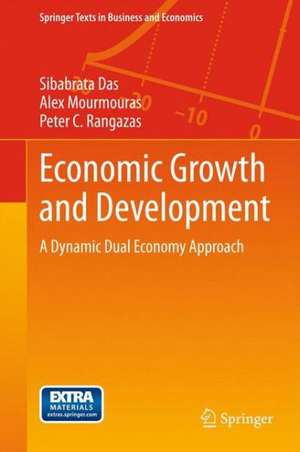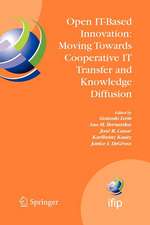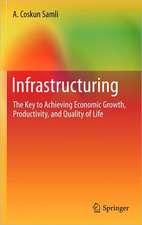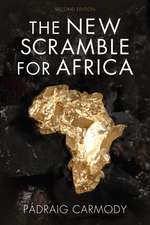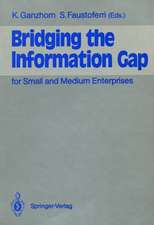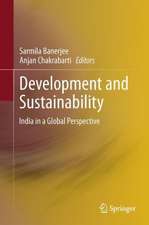Economic Growth and Development: A Dynamic Dual Economy Approach: Springer Texts in Business and Economics
Autor Sibabrata Das, Alex Mourmouras, Peter C. Rangazasen Limba Engleză Hardback – 23 ian 2015
| Toate formatele și edițiile | Preț | Express |
|---|---|---|
| Paperback (1) | 366.15 lei 39-44 zile | |
| Springer International Publishing – 12 oct 2016 | 366.15 lei 39-44 zile | |
| Hardback (1) | 386.95 lei 6-8 săpt. | |
| Springer International Publishing – 23 ian 2015 | 386.95 lei 6-8 săpt. |
Din seria Springer Texts in Business and Economics
- 15%
 Preț: 633.06 lei
Preț: 633.06 lei -
 Preț: 548.24 lei
Preț: 548.24 lei - 20%
 Preț: 567.98 lei
Preț: 567.98 lei -
 Preț: 255.19 lei
Preț: 255.19 lei - 19%
 Preț: 509.83 lei
Preț: 509.83 lei - 17%
 Preț: 522.64 lei
Preț: 522.64 lei - 17%
 Preț: 363.29 lei
Preț: 363.29 lei - 17%
 Preț: 491.51 lei
Preț: 491.51 lei -
 Preț: 548.52 lei
Preț: 548.52 lei - 20%
 Preț: 693.45 lei
Preț: 693.45 lei - 17%
 Preț: 459.66 lei
Preț: 459.66 lei - 19%
 Preț: 465.60 lei
Preț: 465.60 lei - 17%
 Preț: 501.86 lei
Preț: 501.86 lei -
 Preț: 360.01 lei
Preț: 360.01 lei -
 Preț: 361.88 lei
Preț: 361.88 lei -
 Preț: 360.45 lei
Preț: 360.45 lei -
 Preț: 363.03 lei
Preț: 363.03 lei - 17%
 Preț: 363.97 lei
Preț: 363.97 lei - 17%
 Preț: 490.70 lei
Preț: 490.70 lei -
 Preț: 359.92 lei
Preț: 359.92 lei -
 Preț: 463.88 lei
Preț: 463.88 lei -
 Preț: 185.09 lei
Preț: 185.09 lei - 17%
 Preț: 431.53 lei
Preț: 431.53 lei -
 Preț: 555.90 lei
Preț: 555.90 lei - 17%
 Preț: 528.19 lei
Preț: 528.19 lei - 20%
 Preț: 694.02 lei
Preț: 694.02 lei -
 Preț: 320.05 lei
Preț: 320.05 lei -
 Preț: 382.19 lei
Preț: 382.19 lei - 15%
 Preț: 629.52 lei
Preț: 629.52 lei -
 Preț: 361.11 lei
Preț: 361.11 lei - 18%
 Preț: 739.53 lei
Preț: 739.53 lei -
 Preț: 401.78 lei
Preț: 401.78 lei - 17%
 Preț: 395.83 lei
Preț: 395.83 lei - 19%
 Preț: 534.43 lei
Preț: 534.43 lei - 17%
 Preț: 458.54 lei
Preț: 458.54 lei - 17%
 Preț: 523.85 lei
Preț: 523.85 lei -
 Preț: 374.14 lei
Preț: 374.14 lei - 15%
 Preț: 469.85 lei
Preț: 469.85 lei - 15%
 Preț: 637.39 lei
Preț: 637.39 lei - 19%
 Preț: 382.81 lei
Preț: 382.81 lei - 15%
 Preț: 525.03 lei
Preț: 525.03 lei - 19%
 Preț: 567.97 lei
Preț: 567.97 lei - 18%
 Preț: 998.35 lei
Preț: 998.35 lei - 15%
 Preț: 647.96 lei
Preț: 647.96 lei
Preț: 386.95 lei
Nou
Puncte Express: 580
Preț estimativ în valută:
74.07€ • 77.66$ • 61.20£
74.07€ • 77.66$ • 61.20£
Carte tipărită la comandă
Livrare economică 30 ianuarie-13 februarie 25
Preluare comenzi: 021 569.72.76
Specificații
ISBN-13: 9783319142647
ISBN-10: 331914264X
Pagini: 250
Ilustrații: X, 272 p. 16 illus., 8 illus. in color.
Dimensiuni: 155 x 235 x 17 mm
Greutate: 0.58 kg
Ediția:2015
Editura: Springer International Publishing
Colecția Springer
Seria Springer Texts in Business and Economics
Locul publicării:Cham, Switzerland
ISBN-10: 331914264X
Pagini: 250
Ilustrații: X, 272 p. 16 illus., 8 illus. in color.
Dimensiuni: 155 x 235 x 17 mm
Greutate: 0.58 kg
Ediția:2015
Editura: Springer International Publishing
Colecția Springer
Seria Springer Texts in Business and Economics
Locul publicării:Cham, Switzerland
Public țintă
GraduateCuprins
Overview.- Part I. Introduction to Economic Growth.- Neoclassical Growth Theory.- Extensions to Neoclassical Growth Theory.- Two Sector.- Growth Models.- Part II. Dual Economies.- Wage and Fertility Gaps in Dual Economies.- Physical Capital in Dual Economies.- A Complete Dual.- Economy.- Urbanization.- Conclusion.
Recenzii
“This textbook summarizes several decades of research on macroeconomics of development – or, at least, a large part of it. … Detailed exposition, questions for review and end-of-chapter exercises, and an extensive bibliography make this textbook an excellent learning and reference source for those working or aspiring to work in these institutions or for the national governments and think tanks.” (Nigar Hashimzade, Mathematical Reviews, June, 2017)
Textul de pe ultima copertă
Growth theory provides a rich and versatile analytical framework through which fundamental questions about economic development can be examined. This book is an introduction to the newer features of growth theory that are particularly useful in examining the issues of economic development. Structural transformation, in which developing countries transition from traditional production in largely rural areas to modern production in largely urban areas, is an important causal force in creating early economic growth, and as such, is made central in this approach. Towards this end, the authors augment the Solow model to include endogenous theories of saving, fertility, human capital, institutional arrangements, and policy formation, creating a single two-sector model of structural transformation. Based on applied research and practical experiences in macroeconomic development, the model in this book presents a more rigorous, quantifiable, and explicitly dynamic dual economy approach to development. Common microeconomic foundations and notation are used throughout, with each chapter building on the previous material in a continuous flow. With its single model and focus on data and policy analysis, this text is intended for beginning graduate students and policy makers interested in economic development.
Caracteristici
Develops dynamic two-sector models to explain sector differences in productivity, wages, hours worked, fertility, and saving rates, and how structural transformation impacts economic growth Augments the Solow model to include endogenous theories of saving, fertility, human capital, institutional arrangements, and policy formation Provides end-of-chapter questions to solidify main points for less advanced students and model-based problems for more advanced students Includes supplementary material: sn.pub/extras
